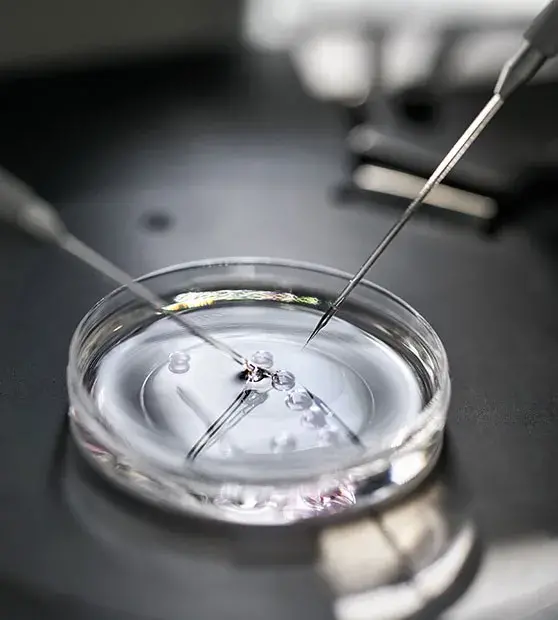PCOS
Polycystic Ovary Syndrome (PCOS) is the most common endocrine disturbance that affects women . PCOS is a heterogeneous collection of signs and symptoms that when considered together form a spectrum of a disorder which presents mildly in some women and for others manifests as a severe disturbance of endocrine (hormonal), reproductive (fertility) and metabolic function. The underlying cause of PCOS appears to be multifactorial and the definition of PCOS has been the cause of much debate. Key features of PCOS include menstrual cycle disturbance, hyperandrogenism (increased male hormonal levels) and obesity but there is considerable variation in the symptoms and signs in women with PCOS
Possible Signs and Symptoms of Polycystic Ovary Syndrome
Symptoms of PCOS
- Menstrual Disturbance (irregular menses / no menses)
- Hyperandrogenism ( increased male hormone levels) : acne, facial hair growth
- Infertility (ovulatory dysfunction)
- Obesity may exacerbate PCOS symptoms
- PCOS ovaries on ultrasound scan with or without symptoms
- Anovulation: failure to release an egg monthly resulting in irregular/no menses
Endocrine (hormonal) Disturbance
- ↑ Androgens (male hormone : testosterone) : excess/unwanted growth of body /facial hair
- ↑ Luteinising hormone (LH) , normal/slightly reduced follicle stimulating hormone (FSH)
- ↑ Fasting Insulin (not routinely measured ) / ↑ Prolactin / Hypothyroidism
Possible Late Consequences of PCOS
- Diabetes Mellitus
- Dyslipidaemia ( abnormal lipid/ cholesterol profile)
- Hypertension ( Increased blood pressure )
- Cardiovascular disease ( heart disease)
- Endometrial carcinoma ( cancer of lining of the uterus)
- Breast cancer
Early diagnosis and treatment of PCOS along with weight loss if indicated may reduce the risk of longterm complications such as type 2 diabetes and heart disease.
Reproductive Endocrinology for the MRCOG & Beyond: Adam Balen, 2007
How to diagnose PCOS?
Tests performed to diagnose this problem include:
- Detailed medical history
- Physical examination
- Pelvic Ultrasound : enlarged ovaries with multiple small cysts
- Blood tests : hormonal profile
Why does PCOS occur?
The exact reason is not known. The following factors may play a role:
- High insulin levels : Insulin is a hormone responsible for regulating sugar levels in the body. Many women with PCOS are resistant to the action of insulin in the body and produce higher levels of insulin to overcome this resistance. Blood sugar levels may increase in response to insulin resistance. Increased insulin may enhance the production of androgen, creating a disturbance in ovulation and menstrual cycles.
- Genetics: Studies have found that various genes are associated with PCOS suggesting a familial inheritance.
- Low-grade inflammation/ autoimmunity : Females having PCOS may suffer from low-grade inflammation/ autoimmunity. This may stimulate androgen (male hormone) production by the polycystic ovaries.
What are the treatment options for absence of or irregular menstrual cycles in females with PCOS?
If overweight or obese with PCOS losing weight is highly recommended as it may normalize hormonal levels. Weight loss may help in restoring ovulation (release of the egg from the ovary) and regular menstrual cycles . Women with PCOS who do not wish to conceive , regular periods may be restored by use of the following medications:
- Oral contraceptive pill may be recommended to induce regular periods.
- Progestogen Tablets: may be prescribed monthly or 3-4 monthly to induce withdrawal bleeds to maintain a thin endometrial lining (uterine lining)
- Mirena Coil will act to maintain a thin endometrial lining (uterine lining) by releasing progesterone locally within the uterus. This may result in no periods over time but maintain a thin endometrium.
By restoring regular periods and maintaining a thin endometrium the risk of developing endometrial carcinoma (cancer of the uterine lining ) will be significantly reduced.
What are the treatment options for infertility in females with PCOS?
The predominant cause of infertility in women with PCOS is anovulation ( failure to release an egg every month). If lifestyle changes such as a healthy diet , exercise and weight loss have not restored regular ovulation and regular menstrual cycles then medication is required to induce ovulation.
The following medications to induce ovulation may be considered:
- Clomiphene is an oral anti-estrogen medication that is generally tried first. It is prescribed in the early part of the menstrual cycle. Ultrasound scanning of the ovaries is advised to monitor the response to the treatment to exclude multiple follicular development which carries the risk of multiple pregnancy.
- Letrozole is an oral medication which may be used to induce ovulation in women with PCOS.
- Gonadotropins may be required if oral medications have proved unsuccessful in inducing ovulation. Gonadotropins are administered by subcutaneous injection.
- Metformin: This oral medication is used in the treatment of type 2 diabetes. It improves insulin sensitivity and subsequently reduces insulin levels which will be of benefit to women with PCOS with resistance to insulin.
- If the above treatments fail to help, then In-Vitro Fertilization (IVF) is an aid for females with PCOS to achieve pregnancy
It is important to see your healthcare provider if experiencing any of the symptoms of PCOS to enable an early and accurate diagnosis. Early diagnosis and management of PCOS is key to prevent the potential long term complications of PCOS. Your health care provider will discuss with you all the available treatment options and formulate a management plan specific to your requirements.





